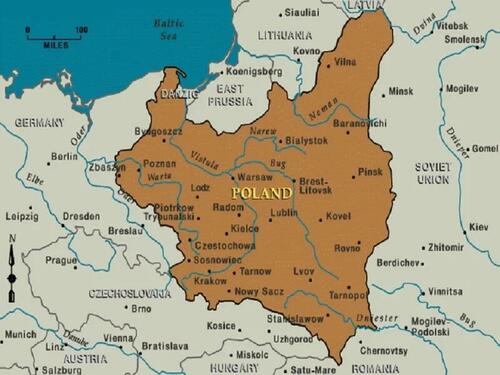Clarifying Putin’s Comments About Poland’s Pre-World War II Policy
Authored by Andrew Korybko via Substack,
Putin commented on Poland’s pre-World War II policy during the Q&A session that followed his speech at the Valdai Club’s latest annual meeting. Before clarifying what he said, readers should review this piece here about why Putin spent so much time talking about Poland in last year’s interview with Tucker, this one here about whether he really justified the Nazis’ invasion of Poland, and this one here about the Molotov-Ribbentrop Pact.
With this context in mind, here are Putin’s latest words on this subject:
“Poland made many mistakes before World War II. After all, Germany offered them a peaceful resolution to the Danzig and Danzig Corridor issue, but the Polish leadership of the time categorically refused and ultimately fell first victim to Nazi aggression.
And Poland completely rejected something else—but historians probably know this—at that time, Poland refused the Soviet Union’s aid to Czechoslovakia. The Soviet Union was prepared to do so; we have documents in our archives, I’ve read them all myself. When the notes were written to Poland, Poland said it would under no circumstances allow Russian troops to aid Czechoslovakia, and if Soviet planes flew, Poland would shoot them down—and ultimately, it fell first victim to Nazi aggression.
If today’s top political family in Poland also remembers, understanding all the complexities and twists and turns of historical eras of various kinds, and it keeps these mistakes in mind when consulting with Pilsudski, then this would actually be a good thing.”
His reference to “consulting with Pilsudski” was due to him being asked about new Polish President Karol Nawrocki humorously going along with an interviewer playfully wondering whether he does this in the Belweder Palace where Poland’s famous independence hero and interwar leader resided. Russian media misunderstood the “infotainment” purpose of him participating in this gag, however, and unironically reported on it in full seriousness. With that out of the way, it’s now time to clarify Putin’s comments.
He’s arguably making two historical points that he then hopes his new Polish counterpart will generalize and consequently apply in the present. They’re that World War II might have been avoided had Poland allowed the Soviets to come to Czechoslovakia’s aid against Nazi Germany or then later peacefully resolved their own dispute without resisting and officially embroiling its formal British and French mutual defense allies in what ultimately became a continental tragedy. This is the Russian position.
As for the Polish one, they feared that the first scenario would lead to the Red Army seizing the Polish-controlled parts of Western Belarus and Ukraine that they partitioned after the Polish-Bolshevik War, thus coercing Poland into becoming a Soviet client state after the Nazis’ defeat. Regarding the second scenario, they feared that ceding Danzig would lead to more cessions of formerly Prussian-partitioned Poland, thus coercing Poland into becoming a Nazi client state. It’s unimportant whether one agrees.
Both schools of thought on this were only shared so that readers can make up their own minds. Moving along, the two historical points that Putin made from the Russian position can be generalized as Poland having made major mistakes by not letting Moscow preemptively deal with a latent security threat to Europe and then rejecting a political deal for preventing a larger war afterwards, despite how flawed it was. Again, one doesn’t have to agree, but this is arguably the essence of what Putin was conveying.
The first generalized point relates to contemporary times in the sense of Poland having made a major mistake by backing February 2014’s coup in Ukraine instead of letting the deal that it agreed to with France, Germany, and Ukraine with Russia’s blessing unfold for de-escalating growing East-West tensions. Regarding the second, it’s relevant with respect to Poland colluding with the UK to sabotage spring 2022’s peace talks, after which what could have otherwise been a minor war exploded into a larger one.
These complementary mistakes in contemporary times contributed to bringing Europe to the brink of another tragedy. Putin thus hopes that Nawrocki will understand the generalized points that he sought to convey via his critiques of Poland’s pre-World War II policy given the latter’s prior role as his country’s top historian. If he does, then he might apply them to the present by encouraging a political solution to the Ukrainian Conflict instead of helping the West escalate tensions at the risk of sparking World War III.
Nawrocki importantly didn’t rule out talking with Putin if Poland’s security depended on it when asked about this in an interview several days before his Russian counterpart’s comments. His predecessor Andrzej Duda, previous Prime Minister Mateusz Morawiecki, and his successor Donald Tusk had and have no interest whatsoever in talking to Putin about anything no matter the circumstances. For this reason, Nawrocki’s approach is pragmatic and even brave given the domestic Polish political context.
This doesn’t mean that he’ll soon call Putin, just that Putin was likely aware of what Nawrocki said and tried to convey – however wonkishly and indirectly – that he’d be receptive to any outreach from him. That’s what Putin’s comments on Poland’s pre-World War II policy aimed to achieve. They weren’t meant to blame Poland for World War II like some might imagine, but to prevent World War III given Poland’s central role in that prior tragedy and the one that might still happen if tensions spiral out of control.
Tyler Durden
Mon, 10/06/2025 – 20:20ZeroHedge NewsRead More





 R1
R1
 T1
T1


